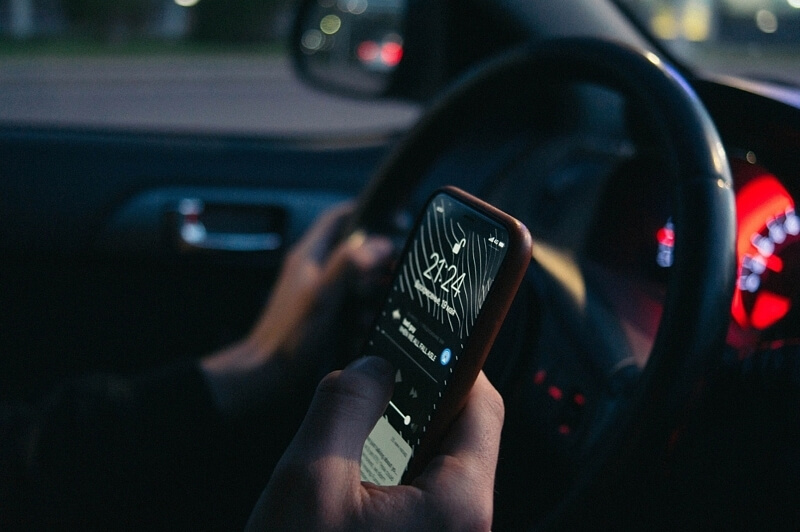On Monday, July 1, 2019, the Tennessee Hands Free Law goes into effect, and it affects us all. This law makes it illegal to use a cellphone while operating a vehicle, protecting us all from distracted driving — an epidemic that’s as dangerous as driving under the influence. The Tennessee Department of Transportation aims to reduce the number of accidents caused by distracted driving and keep Tennessee residents and visitors safe. Before this law, texting and driving was illegal in Tennessee — along with 47 other states. Now, it is illegal for drivers to hold a phone in their hands while operating a vehicle, eliminating the question of why (and yes, it even includes navigation!). Officers will look for signs of driver cell phone use starting on Monday, and there are some unverified rumors floating around that they might even be incognito. Bus drivers, construction workers and other unlikely people on the road might just be police in disguise, so don’t use the absence of a police car as an excuse to grab your phone.
A representative from the Tennessee Department of Safety and Homeland Security tells us, “Last year, there were over 24,600 distracted driving crashes in Tennessee. Through voluntary compliance with the new Hands Free Law, we hope to see a significant improvement in driver behavior to help make our roadways safer.” Tennessee is the latest of 19 states that will enforce a total ban on cell phone use behind the wheel. What exactly does this mean, though? How can you ensure you are following each and every rule? Let’s break it down.
THE RULES
It is illegal for a driver to hold a cellphone or mobile device with any part of their body while operating a vehicle.
Drivers may no longer hold a cellphone while operating a vehicle for any reason. Use your cupholder, purchase a magnetic car mount (we like this one!) or, best of all, leave your phone in your purse or pocket to avoid the temptation of opening an email or text in the car. You may use one button on a cell phone (think: a quick swipe!) to make or take a call, but you must use Bluetooth, speakerphone, an earpiece, a wrist device or otherwise to talk on the phone. And, this hopefully goes without saying, but no FaceTiming!
It is illegal for a driver to write, send or read any text-based communication.
Wait until you are in park to check your emails, and turn your phone on Do Not Disturb if you can. It is unlawful for you to even read a text message, and you certainly should not compose one.
What about at a red light? Technically, you’re still operating that vehicle as the car is on, you are not in park and you are on the road intending to drive. This is what we’ve been told, but we recognize that others may be interpreting “operating a vehicle” differently. But, if you get a ticket for reading an email at a red light, we tried to warn you!
It is illegal for a driver to reach for a cell phone or mobile device in a manner that requires the driver to no longer be in a seated driving position or properly restrained by a seat belt.
Gone are the days of reaching across the middle console down to your purse on the passenger side floor or back behind your own seat in the back. Drop your phone? Pull over or wait until you arrive to grab it. Remember, it’s safety we’re chasing!
It is illegal to watch a video or movie on a cellphone or mobile device.
Please, save your YouTube queue for a safer space.
It is illegal to record or broadcast video on a cellphone or mobile device.
Goodbye to the scary Instagram stories of people filming themselves as they fly down the road. We can all feel a little safer knowing this is illegal now.
FAQs
What happens if I break this law?
Breaking this law is a Class C misdemeanor. Violators will pay $50 for a first-time offense, $100 for a third-time offense or higher for a violation that results in a car crash, and $200 for a violation that occurs in a work zone while workers are present or in a marked school zone while flashers are in operation. Additionally, three points will be added to a driver’s record (12 points result in a suspended license).
What about GPS?
We all use GPS for navigating — even around our hometown for traffic updates. However, it’s important that your phone stays out of touch, and instead sits in your cupholder, on your console or attached to a phone stand. Turn on voice commands to allow for hands-free driving.
And my morning podcast?
Queue it up before you hit the road! You can tap one button on your phone if needed, so if a song or episode change is necessary, that’s technically allowed.
What about an emergency?
In case of an emergency — “a natural or human occurrence that threatens human health, life or property” — a driver can communicate with any emergency service agencies while driving.
Can authorities check phone records?
Yes, they can. According to the Department of Safety and Homeland Security, “If a law enforcement officer witnesses a driver holding a mobile device while driving, the officer may initiate a traffic stop and issue a warning or citation. If a violation of this law results in a serious injury or fatal crash, then the District Attorney’s Office has the authority to determine if phone records should be checked.”
For more information, visit HandsFreeTN.com.
*********
For more of the best of the South — straight to your inbox! — subscribe to our daily newsletter right here.



















